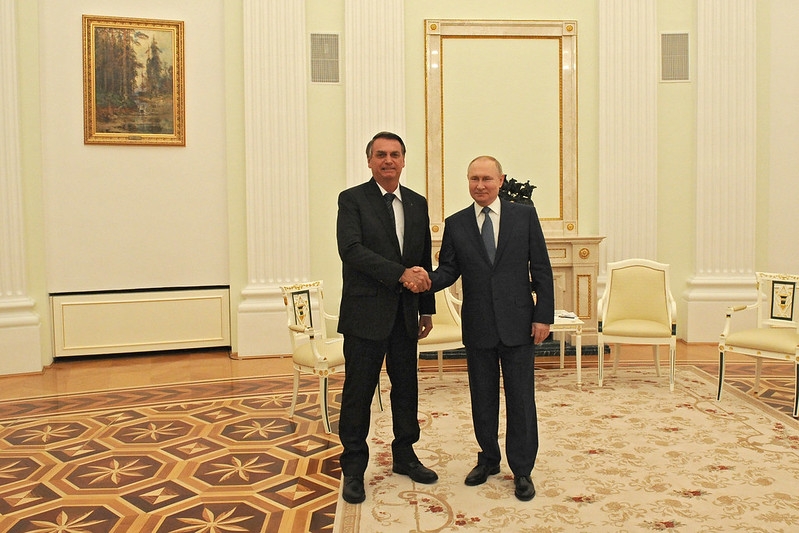
Bolsonaro has yet to condemn Putin for invading Ukraine. For the Brazilian leader, there’s no such thing as unwelcome support
The Brazilian Report
Mar 20, 2022
by Vanessa Barbara
One week before the invasion of Ukraine, Brazil’s President Jair Bolsonaro paid a visit to Vladimir Putin. The alleged purpose of the meeting was to strengthen bilateral trade relations between the countries, focusing particularly on the purchase of Russian fertilizers. Analysts were appalled by the terrible timing of the trip and by Mr. Bolsonaro’s absolute lack of discernment.
It was indeed a diplomatic nightmare. “We are in solidarity with Russia,” Mr. Bolsonaro declared, rather robotically, sitting knee to knee with the man who had been threatening to invade a neighboring nation. Wait, did he really mean that? In any case, he wasn’t willing to elaborate: “We very much want to collaborate in many areas — defense, oil and gas, agriculture.”
Right after the meeting, the U.S. State Department issued a strong rebuke of Mr. Bolsonaro’s “solidarity” statement, saying that the timing could not be worse. “It undermines international diplomacy directed at averting a strategic and humanitarian disaster, as well as Brazil’s own calls for a peaceful resolution to the crisis.”
Mr. Bolsonaro begs to differ: he thinks it is “an exaggeration to speak of massacre,” and that “a big part of Ukraine’s population speaks Russian.” In a recent press conference, he declared that Brazil would remain neutral in the conflict. After all, he wasn’t going to assume a position that could bring “serious harm to agriculture in Brazil.” He also implied, rather randomly, that the Ukrainians are to blame, since they “had trusted a comedian with the fate of a nation.” (He was referring to the fact that president Volodymyr Zelensky once worked in the entertainment industry.)
The truth is that Brazil’s president couldn’t care less for matters of war, diplomacy and foreign relations. The main goal of the visit, as far as we know, was doing a photo op with a major world leader ahead of presidential elections, next October. So far, his chances of reelection don’t look good. But finally here’s a statesman willing to meet him.
In order to fulfill this objective, Mr. Bolsonaro has even agreed to Russian demands that he take multiple coronavirus tests (including one performed by the Kremlin’s doctors) before being allowed to get close to Mr. Putin – something considered unacceptable by French president Emmanuel Macron and German chancellor Olaf Scholz. But Brazil’s president would go any length to shake hands with Mr. Putin and smile. (Frankly, my Russian friends: you missed the opportunity of ordering him to take two shots of the Sputnik-V vaccine. Mr. Bolsonaro still refuses to get immunized against Covid-19.)
Let’s remember what really matters to our government: in 2020, at the end of the annual summit of the BRICS group of emerging powers (Brazil, Russia, India, China and South Africa,) the Russian leader praised Mr. Bolsonaro’s “masculine qualities.” Really. It was maybe one of his greatest achievements in the field of foreign policy. Of course Mr. Bolsonaro would jump at the opportunity of seeing his “friend ” again, whether there was an imminent war or any other inconvenience hovering in the region. Some analysts also tentatively suggested that the Latin American leader was interested in addressing cybersecurity and cyber defense issues with the Russians, perhaps contemplating possible disruptions to the presidential elections.
After visiting the Russian president, Mr. Bolsonaro went briefly to Hungary and shook hands with Prime Minister Viktor Orbán, a far-right, populist leader such as himself. He had planned a visit to another conservative leader, Poland’s president Andrzej Duda, but, according to the newspaper Valor Econômico, the Polish government refused the meeting because they were focusing their diplomacy efforts on the situation at Ukraine.
Our government’s detachment from global affairs is so blatant that, on February 16, a week before the start of the invasion, and as he was leaving his meeting with Mr. Putin, the president thought it was a good idea to imply that he might deserve credit for having averted the conflict. “We maintained our agenda [to come] and, by coincidence or not, part of the troops have left the Ukrainian border,” he said, as robotically as ever. The hashtag #BolsonaroAvoidedAWar started to trend on Twitter. Was it only a joke? A subsequent survey by Quaest/CNN Brasil showed that 22 percent of Brazilians really believed that Mr. Bolsonaro had been responsible for what they perceived as a demobilization of Russian military forces on the border.
It is roughly the same amount of people who intend to vote for his reelection: 26 percent, according to an Ipespe opinion polling, with a margin of error of 3.2 percentage points. Brazil’s former leftist President Luiz Inácio Lula da Silva is leading the poll with 43 percent of voting intentions.
To Jair Bolsonaro, everything is connected to those numbers: he needs votes and he will travel anywhere to boost his campaign. Without Donald Trump to back him up, he turns to other autocrats in an attempt to prove he’s not isolated on the global stage. He’ll refuse to condemn the Russian invasion for as long as he can, despite a strong divergence with the foreign ministry and Brazilian diplomatic corps. Brazil recently voted in favor of a U.N. resolution that deplored the invasion and called on Moscow to withdraw its troops immediately.
But Mr. Bolsonaro couldn’t care less. When speaking to his Russian counterpart – and to the rest of the world – he is actually addressing his own constituents. The solidarity of the president extends only to himself.

